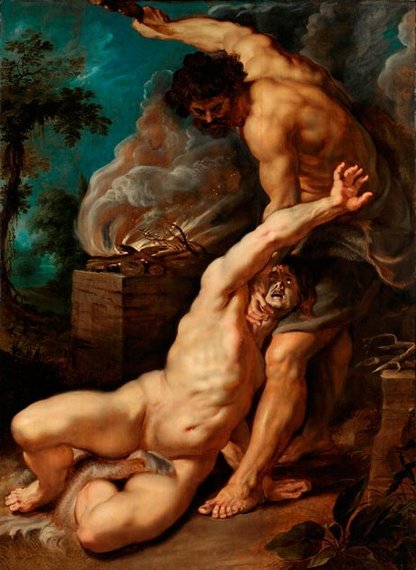On its surface, the story of Cain and Abel is a very simple story. In fact, the book of Genesis describes the crime in a single verse:
"And Cain said to his Abel, his brother; and it was when they were in the field, Cain rose up against Abel, his brother, and killed him." (Genesis 4:8)
It seems clear that Cain is the Bad Guy, the criminal, and Abel is the Good Guy, the victim. The rabbis of the Midrash, though, radically reread two key elements of this verse and completely undermine the original understanding of the episode. To the rabbis, the story is less a historical event and more a meditation on the human experience. Throughout history, Cains and Abels have battled, and the rabbis force us to consider sometimes uncomfortable truths about the broader story of human relations.
I: Causes For Conflict
The Biblical account implies that Cain murdered his brother in a fit of jealous anger after his sacrifice was rejected and Abel's was accepted. The rabbis, though, focus on the lacuna at the beginning of the key verse -- what did Cain say to Abel -- and offer several creative suggestions. One asserts that they were negotiating the division of the world between them. One brother claimed all of the land in the world, and the other all of the movable goods upon it. Then one claimed the land the other was standing upon, and the other claimed the clothing the first was wearing. Violence ensued. A second rabbi felt that Cain and Abel could have agreed on how to divide the world physically, but each claimed the right to have God's Holy Temple in their half. Again, violence ensued. A third rabbi felt they were fighting over a woman.
In today's world, much ink is spilled trying to figure out which conflicts are based on religious motivations, which are based on social or economic factors, and which are based on personal agendas or even pure hatred and bias. In this context, the rabbis tell us that, people are complicated. Motivations for conflict often overlap, feed into each other, and are even interchangeable to some degree. When we reduce conflict to "hatred," "bias," or the like, we blind ourselves to the complex sets of forces and influences beneath the surface.
II: Justifications For Conflict
In the Biblical account of the story, Cain is an unjustified aggressor, and Abel is his innocent victim. Cain has no reason to direct force against Abel, who never even does anything, or even says anything to him in the course of the narrative. In the rabbis' retelling, neither Cain nor Abel is any more right or wrong than the other. They each make claims against the other, and both are justifiable, as irreconcilable as they may be in light of each other.
Our first reaction to a violent confrontation is often an attempt to figure out which side is correct and which is not. The rabbis remind us there is often a context of conflict that envelops both sides, and from which violence emerges. Sometimes it is explicit, and sometimes it is implicit, but recognizing this reality and searching it out is critical if we want to prevent situations from deteriorating into tragedies.
III. Resolving Conflict
The second jumping-off point for the rabbis is the phrase "And Cain rose up." The plain meaning of the text is that Cain aggressively pounced on a hapless, passive Abel. However, the rabbis completely change the sense of the words by explaining that, if Cain "rose up" against Abel, he must have been down before him. In other words, Cain was losing the fight until he managed to distract Abel and turn the tide. Cain may have killed Abel, but, in the end, he did it in self-defense!
In the conclusion of the story, God confronts Cain, who admits his guilt. The rabbis are teaching us that, even if Abel was not blameless as their argument descended into physical violence, Cain was ultimately indicted for responding with overwhelming deadly force. Perhaps living with unresolvable conflict, even one that is often violent, is better than that kind of final resolution. Perhaps Cain should have backed down, even to the point of giving Abel what he wanted, if that was the only way to avoid killing him. Alternatively, perhaps Cain did what he needed to do, even if he had to live the rest of his life with the consequences of that action.
Ultimately, the rabbis do not give us an alternate reality in which Cain and Abel peaceably resolve their differences. There is always something to fight over, and the tendency towards conflict seems hard-wired into the human experience. Cain and Abel are always tensely walking into the battlefield, all around the world and throughout recorded history. That somberly noted, the empathy and cool-headedness necessary to see the story as it first appears and then overlaid with its exact opposite offers a chance to hit the brakes on the road to even more bloodshed and calamity to come.

